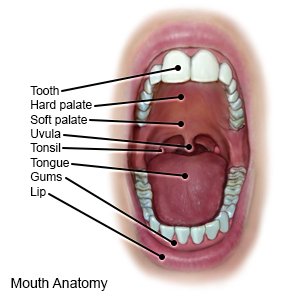Uvulopalatopharyngoplasty
Medically reviewed by Drugs.com. Last updated on Aug 4, 2025.
Uvulopalatopharyngoplasty (UPPP) is surgery to remove part or all of your uvula, soft palate, pharynx, or tonsils. Your soft palate is the back of the roof of your mouth. The uvula is the small piece of flesh that hangs at the back of your throat. The pharynx is your throat. UPPP may help you breathe easier, decrease snoring, and treat your sleep apnea.
 |
WHILE YOU ARE HERE:
Before your surgery:
- Informed consent is a legal document that explains the tests, treatments, or procedures that you may need. Informed consent means you understand what will be done and can make decisions about what you want. You give your permission when you sign the consent form. You can have someone sign this form for you if you are not able to sign it. You have the right to understand your medical care in words you know. Before you sign the consent form, understand the risks and benefits of what will be done. Make sure all your questions are answered.
- An IV is a small tube placed in your vein that is used to give you medicine or liquids.
- General anesthesia will keep you asleep and free from pain during surgery. Anesthesia may be given through your IV. You may instead breathe it in through a mask or a tube placed down your throat. The tube may cause you to have a sore throat when you wake up.
During your surgery:
Medical tools will be used to hold your mouth open during the surgery. Your surgeon will use a laser to remove tissues that are blocking your throat. He or she may remove part or all of your uvula. He or she may remove your soft palate and tissues in your throat. Your tonsils and adenoids may also be removed. Your surgeon will watch for problems, such as bleeding. He or she may need to use stitches that absorb to stop the bleeding.
Related medications
After your surgery:
You will be taken to a room to rest until you are fully awake. You will be monitored closely for any problems. Do not get out of bed until your healthcare provider says it is okay. You will then be able to go home or be taken to your hospital room.
- You may need extra oxygen if your blood oxygen level is lower than it should be. You may get oxygen through a mask placed over your nose and mouth or through small tubes placed in your nostrils. Ask your healthcare provider before you take off the mask or oxygen tubing.
- You will need to eat soft foods for several days. Examples of soft foods include cooked cereal, yogurt, cottage cheese, and applesauce. Once you can eat soft foods easily, you may slowly begin to eat solid foods.
- Medicines may be given to relieve pain or nausea, or to prevent an infection caused by bacteria.
RISKS:
You may bleed more than expected or get an infection. The sound of your voice may change. You may lose your sense of taste temporarily. It may feel like there is a lump in your throat when you swallow. The laser may scar the inside of your throat. Your snoring or sleep apnea may not go away or may get worse. You may need another UPPP.
CARE AGREEMENT:
You have the right to help plan your care. Learn about your health condition and how it may be treated. Discuss treatment options with your healthcare providers to decide what care you want to receive. You always have the right to refuse treatment.© Copyright Merative 2025 Information is for End User's use only and may not be sold, redistributed or otherwise used for commercial purposes.
The above information is an educational aid only. It is not intended as medical advice for individual conditions or treatments. Talk to your doctor, nurse or pharmacist before following any medical regimen to see if it is safe and effective for you.
Learn more about Uvulopalatopharyngoplasty
Care guides
Further information
Always consult your healthcare provider to ensure the information displayed on this page applies to your personal circumstances.
